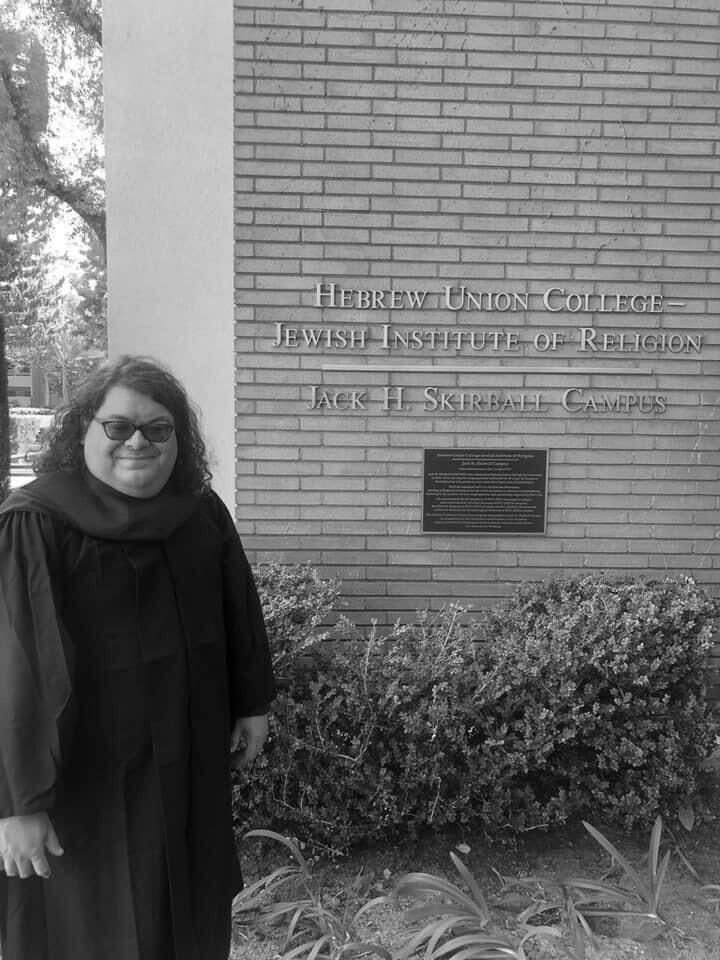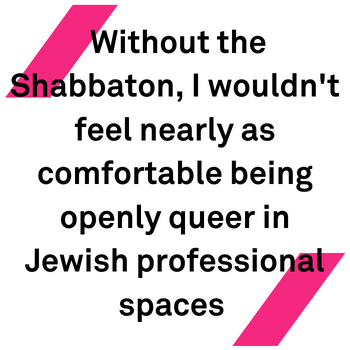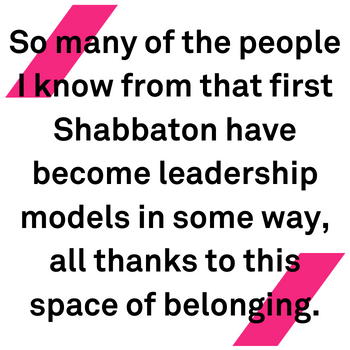

Keshet: Can you start by telling me a little bit about where you were in your life when you first came into contact with Keshet?

Frankie: I was 18 and a senior in high school. I had just done the Brandeis Genesis program the summer before, and it was through that program that I became aware of the Keshet Shabbaton. There was at least one other person from that program who went, and at the time, I identified as a gay man, so I was excited about that as an intersection with my Judaism. I jumped at the opportunity.
It was one of the most special weekend experiences I’ve had. It wasn’t a huge group. There were only maybe 10 of us, but I had never been in a space where we all felt that connected. It was just this open space.
Keshet: Did you get involved in the leadership and planning pretty soon after you attended the first Shabbaton?
Frankie: Yes! I got to be a main member of the planning committee, and I kept with it throughout my entire time in undergrad. I’d eventually become part of the staff at the southern and west coast Shabbatonim.
Keshet: What kept you wanting to be there as a staff person?
Frankie: The connections I made with other queer Jews, no matter what background we came from. I loved being able to honor and celebrate our differences and learn together. That and the investment from adult leaders made me feel like I was growing as a community builder. I felt so much respect and comfort.
Keshet: That’s wonderful.

Frankie: And the conversations around consent were really special as well. I grew up in Indianapolis, IN in the Midwest. The idea of queer sex ed was foreign, and there was nothing for me to consume as a queer person. And no one was talking about consent as an interpersonal value that was beyond sexuality.
One of my favorite moments [at a Shabbaton] was when I was sitting with another college student the morning after having the conversation around consent. One of the teens had come to us to brag about an experience that they had and how consensual that they had been during the experience. And they were just so proud to be talking about it! Getting to be able to be a part of creating those spaces was something I loved.
Keshet: How have these experiences influenced your future?
Frankie: One of the biggest reasons I’m pursuing rabbinical school now is because the Shabbatonim showed such an amazing potential for relationship, community building, and the synergy between Judaism and queerness. I like to ask myself, “How can I be the role model I needed as a young queer Jew?” I also love that the Shabbatonim showed me that there are ways to do Judaism that are respectful toward liberal Jews and also aren’t alienating for more halachic Jews – that we can coexist in the same space together.
Keshet: What would be different about your life now than if you hadn’t had those experiences?

Frankie: Without the Shabbaton, I wouldn’t feel nearly as comfortable being openly queer in Jewish professional spaces as I have been. I’m thankful that, because of organizations like Keshet, more and more institutions and communities are seeing that there is a real, large need to cater to this growing sect of the Jewish community. And it’s led me to discover what being a queer rabbi could look like.
Keshet: Is there anything else you wanted to share?
Frankie: It was a big risk for Keshet to start the Shabbatonim in the first place. And it was a powerful choice to say, “We want to invest in queer Jewish youth. We want to give them power to create this experience. We want to pay to bring them back out to plan things like this.” Taking that chance was really special. And so many of the people I know from that first Shabbaton have become leadership models in some way, all thanks to this space of belonging.
Frankie Salzman (they/them) is a fourth-year Rabbinical Student at the Hebrew Union College-Jewish Institute of Religion on the Los Angeles campus. They grew up in Indianapolis, IN, and received their undergraduate degree from Indiana University with a double major in Jewish Studies and Religious Studies in December 2016. They are passionate about queer advocacy and equitable treatment for all. When not working, they enjoy all things nerdy, especially LARP (Live Action Role Playing).
Back to 10 Years of Keshet Shabbatonim.